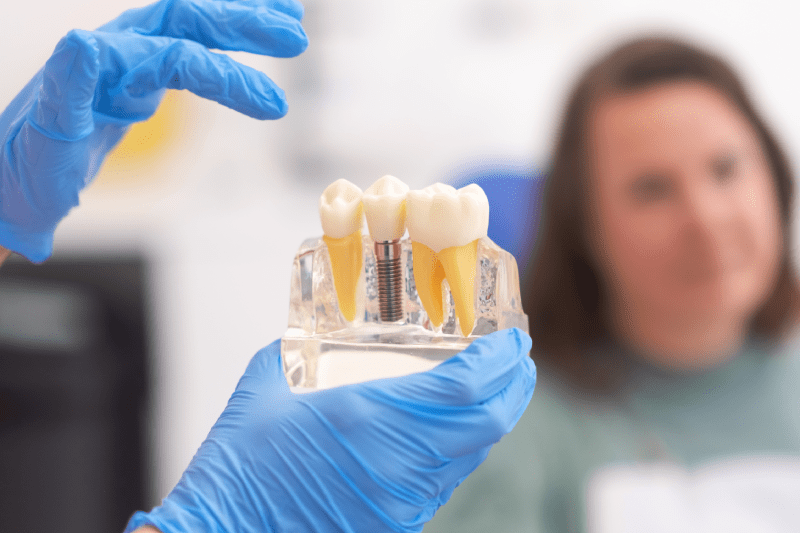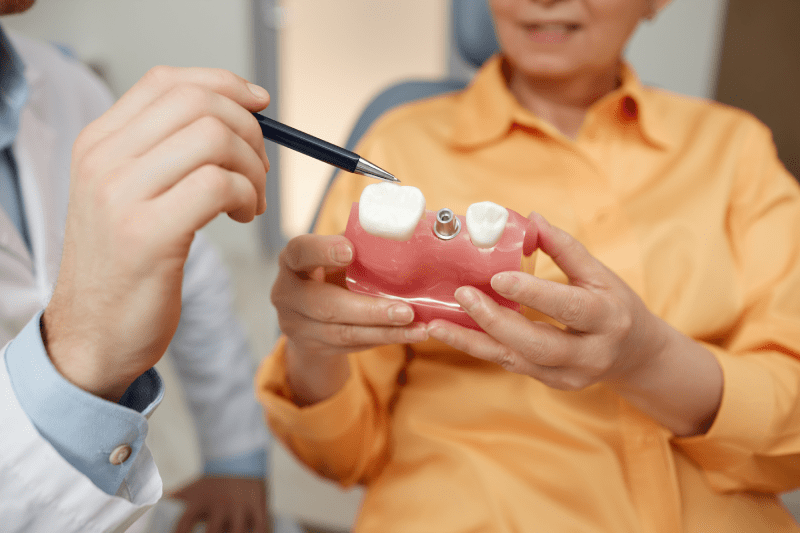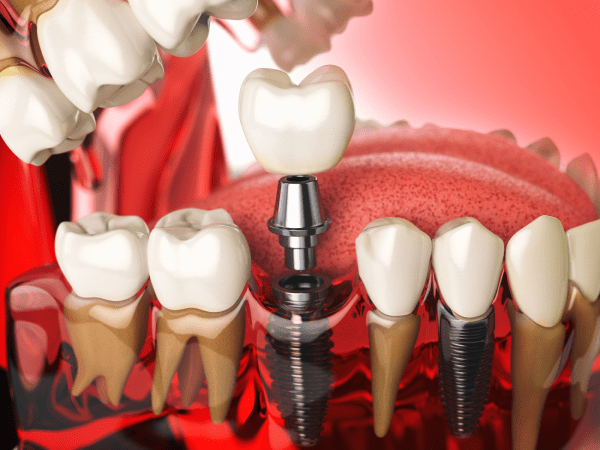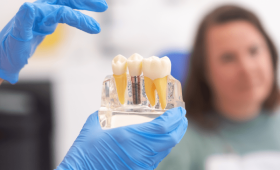Is An Osteoporosis Diagnosis A Complete Barrier To Implant Treatment?
No, an osteoporosis diagnosis does not completely bar implant treatment; however, it can make the treatment more complex and risky. The key to implant success is the sufficient and strong integration of the implant with the jawbone (osseointegration). Osteoporosis negatively affects this process by reducing bone density. This situation can prolong the healing time of the implant or increase the risk of failure. The crucial factors for success are that the disease is under control, the medications used, and the current condition of the bone are analyzed in detail. Experts state that with proper planning, successful implants can be performed on patients with osteoporosis in Turkey.
How Does Jawbone Density Affect Implant Success?
Jawbone density is of vital importance for the longevity and success of the implant. Low bone density reduces the stability of the implant and makes it harder for the implant to anchor strongly enough to the jawbone. In patients with osteoporosis, this decrease in density can lead to the implant loosening or being lost in the early stages. Therefore, bone quality should be measured in detail with 3D tomography before the implant, and planning should be done accordingly. Advanced imaging techniques are commonly used for this purpose in Turkey.
How Do Bisphosphonates Affect Implant Treatment?
Bisphosphonates are commonly used in osteoporosis treatment to slow down bone loss, but these drugs can increase the risk of osteonecrosis (bone death) in the jawbone. Bisphosphonates administered intravenously (mostly used in cancer patients) carry a higher risk. Patients using these drugs may need to stop the medication for a period before getting implants. This decision must be made in consultation with an internal medicine or endocrinology specialist and is crucial for treatment success. Experts emphasize that these patients are treated with a multidisciplinary approach in Turkey.
Should Bisphosphonates Be Discontinued Before Getting Implants?
Yes, patients using high-dose or intravenous bisphosphonates are strongly advised to discontinue the medication for a certain period before implant surgery. The duration of this break is determined by the type and dose of the drug used and the patient’s general health status, typically ranging from a few weeks to several months. It has been observed that the bone’s healing potential in the implant area increases after the drug is stopped. The duration of treatment interruption should be jointly planned by the patient’s physicians and surgeons.

Is Bone Grafting Required In Implant Placement?
In patients with reduced bone density due to osteoporosis, bone grafting (bone powder application) is frequently required to provide sufficient bone volume for the implant to anchor. Bone grafting increases the volume and density of the bone around the implant, enhancing the chance of osseointegration. The healing process of the graft in patients with osteoporosis can be longer than in healthy individuals. In Turkey, biomaterials derived from the patient’s own blood to support healing can also be used in such cases.
What Is The Implant Success Rate In Osteoporosis Patients?
The implant success rate in osteoporosis patients may be slightly lower than in healthy individuals, but this rate can be kept at very high levels with correct diagnosis, planning, and surgical technique. In well-controlled osteoporosis patients under appropriate medication, the success rate can range between 85% and 90%. The surgeon’s experience, the surface properties of the implant (which integrate quickly with the bone), and the patient’s oral hygiene are of great importance for success.
Is The Placement Depth Of Implants In The Jawbone Important?
Yes, the placement depth and angle of the implants in the jawbone are of critical importance in patients with osteoporosis. Regions with the highest bone density (generally the anterior part of the mandible) are preferred, and the implants are positioned at the most suitable angle to the existing bone to ensure maximum stability. Placing the implant deep enough ensures it receives support from the surrounding cortical (dense) bone, increasing the chance of anchorage. This sensitive planning is carried out meticulously by expert surgeons in Turkey.
Do Calcium Supplements Used In Osteoporosis Treatment Support The Implant?
Calcium and Vitamin D supplements used in osteoporosis treatment can indirectly positively support the implant healing process, as they improve overall bone health. These supplements can help achieve better osseointegration by increasing the activity of bone cells around the implant. However, it should be remembered that these supplements alone do not guarantee implant success; the main factor is local jawbone density. Physicians in Turkey recommend monitoring overall bone health as well.
How Does Smoking Affect Implant Success?
Smoking multiplies the risk of implant failure in patients with osteoporosis. Smoking reduces blood flow to the bone, seriously slowing down the healing process of the bone around the implant and increasing the risk of infection. Especially the healing capability of the bone already weakened by osteoporosis is further diminished by smoking. Therefore, completely quitting smoking for at least 4-6 weeks before and after surgery is a mandatory condition for treatment success.
Where Is The Most Ideal Jaw Region For Implants?
The most ideal jaw region for dental implants is the anterior part of the mandible, where bone density is naturally highest. Since bone quality is better and bone density loss is less common in this area, the success rate of implants is high even in patients with osteoporosis. The posterior regions of the upper jaw (especially the sinus areas) are the regions with the lowest bone density and where the need for grafting is most frequent. Specialists in Turkey achieve successful results by utilizing the advantages of the anterior region.

Can Different Implant Materials Be Used Instead Of Titanium?
Traditionally, titanium is the gold standard for dental implants due to its biocompatibility and strength. However, in patients with osteoporosis or titanium allergies, zirconium implants may be considered as an alternative. Zirconium is an aesthetic, metal-free option, and some studies have shown its potential for bone integration to be close to that of titanium. Material selection should be determined according to the patient’s bone structure and the surgeon’s experience.
Is The All-On-4 Technique Suitable For Osteoporosis Patients?
The All-on-4 technique aims to treat full edentulism with only four implants even in patients with insufficient bone volume in the jawbone, and it usually eliminates the need for bone grafting. This technique relies on placing angled implants in the anterior region where the bone is densest. Due to these features, it can be a good solution for patients with mild to moderate osteoporosis. However, in the presence of severe osteoporosis, bone density may be insufficient.
Does The Fusion Time Of Implants To The Jawbone Take Longer?
In patients whose bone metabolism slows down due to osteoporosis, the time for the implants to fuse with the jawbone (osseointegration) may take longer than in healthy individuals. This period, which is normally 3-4 months, may extend to 6 months or more. Surgeons may decide to keep the implants protected within the bone for a longer period, considering this extended process. Clinics in Turkey try to optimize the healing process by closely monitoring patients during this period.
Why Are Radiological Examinations (3D Tomography) Vitally Important?
Radiological examinations, especially 3D Computed Tomography (CT), are vitally important in patients with osteoporosis because they measure the existing volume and density of the jawbone with millimeter precision. This imaging allows the surgeon to fully visualize the quality of the bone where the implants will be placed and to identify critical nerve/vascular structures. Avoiding areas of inadequate bone and placing the implant in the strongest bone area is the key to success.
Which Jawbone Is Most Affected By Bone Density Loss?
Although bone density loss affects all bones in the body in osteoporosis, it generally affects the upper jaw more in the jawbone. The upper jawbone is more spongy and less dense than the lower jaw. Additionally, the sinus cavities in the upper jaw can accelerate bone loss. Therefore, placing implants in the upper jaw is often more challenging and requires more frequent bone grafting. Special techniques such as sinus lift are used for upper jaw implants in Turkey.
Is Bone Strengthening Treatment Required After Implants Are Placed?
The continuation of general osteoporosis treatment after the implants are placed is important for the long-term stability of the bone around the implant. Physicians may recommend continuing medication treatment to increase or preserve bone density even after the implant placement. This helps the implant remain stable not only in the initial stage but also over the years. The patient’s general bone health is considered an integral part of the treatment in Turkey.
How Does Oral Hygiene Increase The Risk Of Implant Failure?
Oral hygiene is a factor that directly affects the risk of implant failure, and this risk is further increased in patients with osteoporosis. Poor hygiene can cause an infection called peri-implantitis around the implant. This infection accelerates bone loss, leading to the implant loosening. In patients with osteoporosis, the spread of infection can be faster and bone loss more destructive. Therefore, impeccable oral care is essential.
Are There Special Implant Types For Osteoporosis Patients?
Yes, there are implants specifically designed for patients with osteoporosis, with modified surface properties. These implants have a special surface coating that encourages bone cells to attach to the surface faster and stronger. Such implants can provide an advantage to patients with osteoporosis by shortening the time of integration with the bone and increasing the success rate. Modern clinics in Turkey utilize these advanced implant technologies.

Do Medications Applied Locally To The Bone Support The Implant?
Some medications or biological agents applied locally to the bone (e.g., blood products like PRP, PRF) can be used to support bone healing around the implant. These agents contain growth factors that encourage the growth and differentiation of bone cells. Such local applications, in addition to surgery, can be beneficial for increasing the healing potential in patients with osteoporosis.
When Are Permanent Teeth Placed On The Implants?
The placement of permanent teeth (loading) on the implants in patients with osteoporosis may be postponed for at least 6 months or longer. A longer healing period is waited to ensure that the implants are fully integrated with the bone due to the low bone density. During this time, patients continue their lives with temporary prostheses that meet their aesthetic and functional needs.
Which Specialists Should Be Consulted Before Implant Treatment?
Before starting implant treatment, consultation with the patient’s dentist as well as Endocrinology or Physical Therapy and Rehabilitation specialists who are monitoring the patient’s osteoporosis is mandatory. These specialists provide information about the type and dose of the medications used, helping to determine the most appropriate timing for implant surgery. This multidisciplinary approach forms the basis of a safe treatment process in Turkey.
What Are The Costs If Implant Failure Occurs?
The costs incurred in case of implant failure generally cover the removal of the implant, cleaning the area, and the need for additional bone grafting before attempting a new implant. Failure is usually evaluated within the scope of the warranty conditions of the surgical package. It is important for patients working with Cure Holiday to check whether part or all of the revision costs are covered by the warranty in case of failure.
How Do Temporary Prostheses Affect The Pressure On The Jawbone?
Temporary prostheses used during the implant healing period must be specially designed so as not to put pressure on the implants during the healing phase. Excessive load on the implant in the early stages disrupts the bone integration process and leads to implant loss. Since this risk is higher in patients with osteoporosis, the sensitive adjustment of temporary prostheses is vital.
Should Sports And Physical Activity Be Restricted During The Treatment Process?
Yes, sports and intense physical activity should be restricted during the healing period after implant surgery. Especially during the first 1-2 weeks after implant placement, heavy lifting, bending, and intense exercise should be avoided. This restriction helps control blood pressure, reducing the risk of bleeding and swelling. Patients should receive clear instructions from their physician on when they can return to normal physical activity.
How Should Nutrition Be During Implant Treatment Healing?
The focus should be on soft, warm, and liquid foods for the first few days after implant treatment. As healing progresses, a transition is made to softer solid foods. Avoiding hard, hot, spicy, or sticky foods protects the implant site from irritation and prevents damage to the stitches. Balanced and protein-rich nutrition is important for osteoporosis patients as it supports bone healing.
How Do Implant Size And Length Affect Success?
The diameter and length of the implant are of great importance, especially in patients with low bone density osteoporosis. Shorter but wider diameter implants can help increase stability by receiving better support from the available bone surface. Physicians perform meticulous planning to select the most suitable implant size for the strongest bone area. Surgeons in Turkey offer personalized solutions in implant selection.
Are New Treatments Available To Increase Bone Density?
New drugs and biological treatments aimed at increasing bone density are constantly being developed in osteoporosis treatment. These treatments can increase the bone’s ability to regenerate, elevating the healing potential around the implant. These new treatments can be planned by a specialist to strengthen the patient’s overall bone health before the dental implant.
Is The Risk Of Infection Around The Implant (Peri-Implantitis) High?
Peri-implantitis is inflammation of the tissue around the implant, leading to bone loss. Since the bone is already weak in patients with osteoporosis, the risk of infection progression and implant loss is higher. Early diagnosis of infection, aggressive hygiene measures, and regular professional care are required to minimize this risk.
How Is Pain Control Managed After Implant Treatment?
Pain after implant treatment is usually intense for the first few days and is easily controlled with prescription painkillers. Since healing may be slow in osteoporosis patients, physicians may recommend longer use of painkillers and anti-inflammatory drugs. Applying cold compresses is also an effective method for controlling swelling and pain.

Does The Progression Of Bone Resorption Shorten The Life Of The Implants?
If osteoporosis is not effectively controlled and bone resorption continues to progress, this situation can shorten the life of the implants in the long term. Even if the implants anchor successfully, they may loosen and be lost if the surrounding bone support decreases over time. Therefore, implant treatment should be part of a comprehensive treatment plan where osteoporosis is kept under control.
How Should Long-Term Follow-Up Of Implants Be Done?
Long-term follow-up of implants in patients with osteoporosis should be done more frequently and meticulously than in healthy individuals. Dental check-ups at least twice a year, periodic X-rays to evaluate the bone level around the implant, and professional implant cleaning are mandatory. These routine follow-ups enable early diagnosis and intervention for potential problems. Clinics in Turkey also use remote follow-up methods for international patients.
Is There An Age Limit For Implant Treatment?
There is no upper age limit for dental implant treatment; what is important is that the patient’s general health status and bone quality are suitable for surgery. Even elderly patients with osteoporosis can receive successful implant treatment if their disease is under control and supported by bone grafting. The suitability of the individual for treatment is determined as a result of a comprehensive health assessment.
Is Bone Grafting Cost Included In Implant Pricing?
Additional procedures such as bone grafting (sinus lift or bone powder) are generally not included in the initial price of implant treatment. These procedures are added to the price quote as a separate fee item because they increase the surgical difficulty and the cost of the materials used. When purchasing full mouth implant packages in Turkey, it is important to clarify whether the grafting cost is included in the package if osteoporosis or bone loss is diagnosed.
Are Special Toothbrushes And Care Products Needed After Implants?
Yes, special care products such as implant toothbrushes, special interdental brushes, and water flossers are required after implants. These products clean the hard-to-reach areas around the implant, minimizing the risk of peri-implantitis. Meticulous care is essential, especially against the risk of infection spread in osteoporosis patients.
Do Insurance Companies Cover The Cost Of Implants?
Most overseas insurance companies do not fully cover dental implant treatment, especially additional costs such as bone grafting due to osteoporosis. Implants are generally considered an aesthetic or luxury treatment category. However, some additional dental insurance policies may cover a portion of the cost. It is important to carefully check the details of your policy before coming to Turkey.
How Do Clinics In Turkey Approach Osteoporosis Risk?
Leading clinics in Turkey approach the risk of osteoporosis with a holistic and interdisciplinary approach. It is standard for the patient to first obtain approval from an internal medicine or endocrinology specialist, the medications used to be reviewed, and surgical planning to be carried out with 3D tomography data. In risky situations, longer healing times and specially surfaced implants are preferred. This careful process increases the reliability of the treatment.
Manage Osteoporosis Risk With Cure Holiday
An osteoporosis diagnosis does not have to prevent your dream of dental implants, but it requires the risks to be managed very carefully. The success of the treatment depends not only on surgical skill but also on correct medical cooperation.
Cure Holiday connects you with expert centers in Turkey that manage the implant treatment of osteoporosis patients with a multidisciplinary approach, according to international standards and with the highest success rates. Contact Cure Holiday immediately to ensure the safety and success of your treatment process and take the first step towards having permanent teeth while preserving your bone health.



